Access free Arizona divorce records in only minutes using this step-by-step resource.
Divorce records comprise public documents that are viewed and consumed due to the implementation of the Arizona’s Public Records Law and the overarching federal Freedom of Information Act (FOIA).
These records can be found through official channels via county and state agencies at no cost, except when needing copies made. Citizens will often need divorce records when they choose to remarry, settle financial matters or for immigration purposes.
Patrons can search for dissolution records in Arizona regardless of which county issued them. Moreover, this article provides concise information and aggregate links to help interested patrons find the records they need.
Are Divorce Records Public or Private in Arizona?
Divorce records in the state are part of court data, and they are mostly available for the public to access due to the Arizona Public Records Law.1 This means that anyone can view these records without presenting a reason to do so. There are, however, some exceptions.
These include divorce documents that may be sealed by the court at the request of the party of the records for purposes of privacy. Moreover, Arizona is considered a closed records state.2 This means only certain eligible individuals, such as owners of the records, immediate family members and legal representatives authorized by the courts, can request certified copies of divorce decrees.
There is a difference between divorce records and decrees. Divorce records are generated documents that serve as proof that the separation took place. Decrees, on the other hand, are documents that are signed and issued by the courts to a couple that has been granted the divorce.
Nevertheless, anyone can access divorce records filed before 1950 without needing to be one of the authorized persons.
Citizens also have the option of contacting third-party vendors to help them search for divorce records—this is particularly useful if they are unsure where the decree was filed or do not desire to deal directly with public agencies.
Regardless of whether the public can view divorce records, the U.S. Census Bureau maintains dissolution rates for all 50 states. As of 2021, New Mexico has a divorce rate of 6.3 per 1000 individuals, slightly lower than the national average of 6.9. This data point is a general statistic and does not distinguish between types of couples as same-sex.
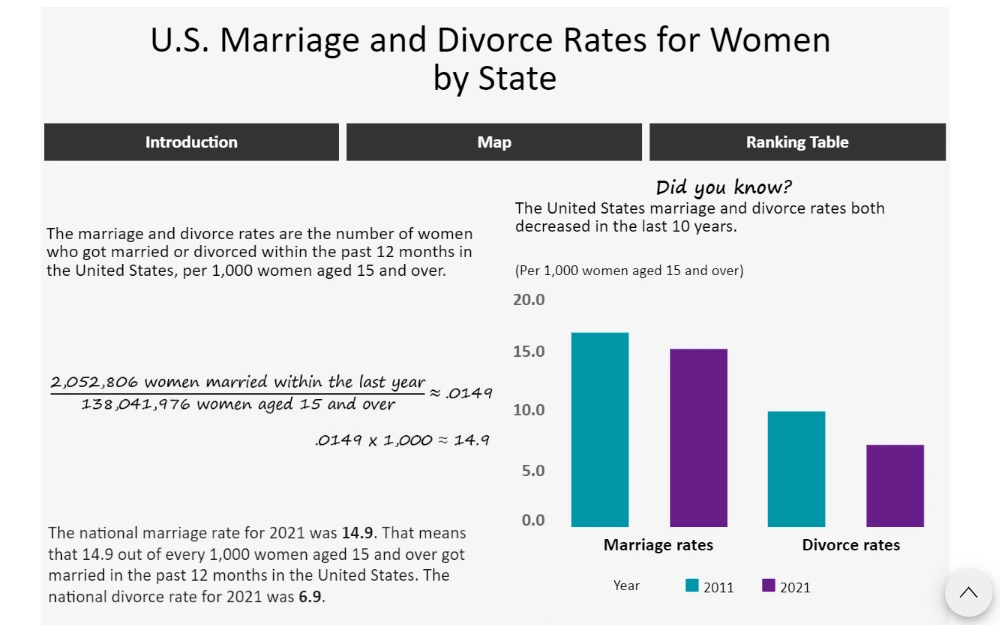
New Mexico has had a +/- 1.7 variance in divorce rates between 2011 and 2021, which implies the rate has remained fairly constant.
How To Find Arizona Divorce Records at No Cost
Interested parties searching for Arizona divorce records will need to get in touch with the Clerk of the Superior Court where the dissolution was filed—the State’s Department of Health does not host this data as is customary in many states.
Nevertheless, patrons may still view divorce records using an alternative agency—the Arizona Judicial Branch. The Arizona Judicial Branch does furnish Online Public Access to Court Information from court cases in 177 out of 184 counties in the state—with the exception to some records.
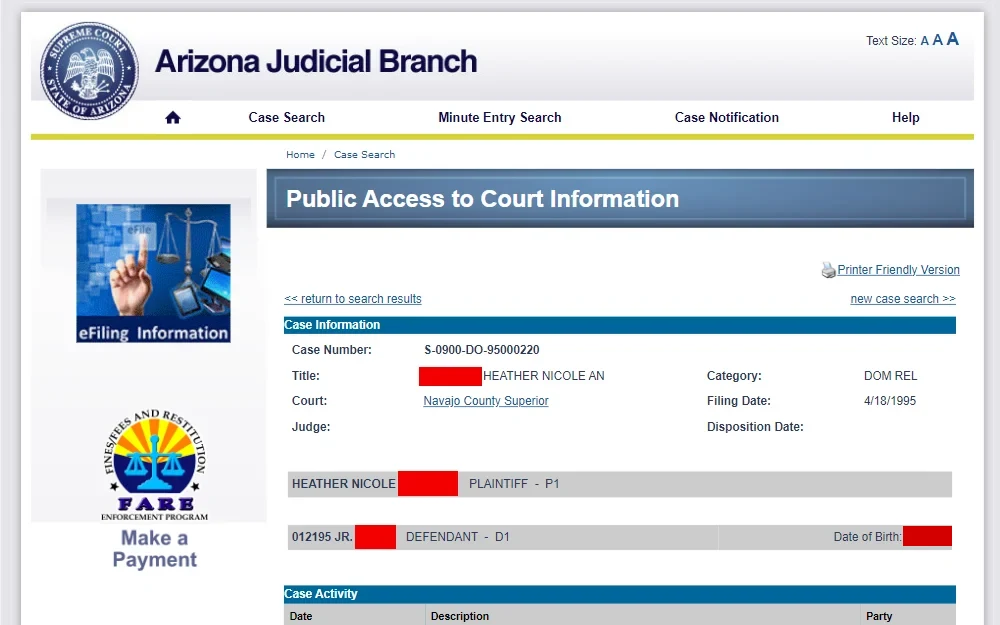
Accessing this portal to run a free public divorce records search, users have the option of searching by name or case number if they know it. They will need to select the county where the dissolution was filed when using either criterion.
The Judicial Branch also provides eAccess which allows the citizens to view and pay for court records through a subscription—the least expensive plan is a pay-as-you-go subscription plan that is free but charges $10.00 per document. Users have the ability to verify certified copies of records in their possession or those ordered.
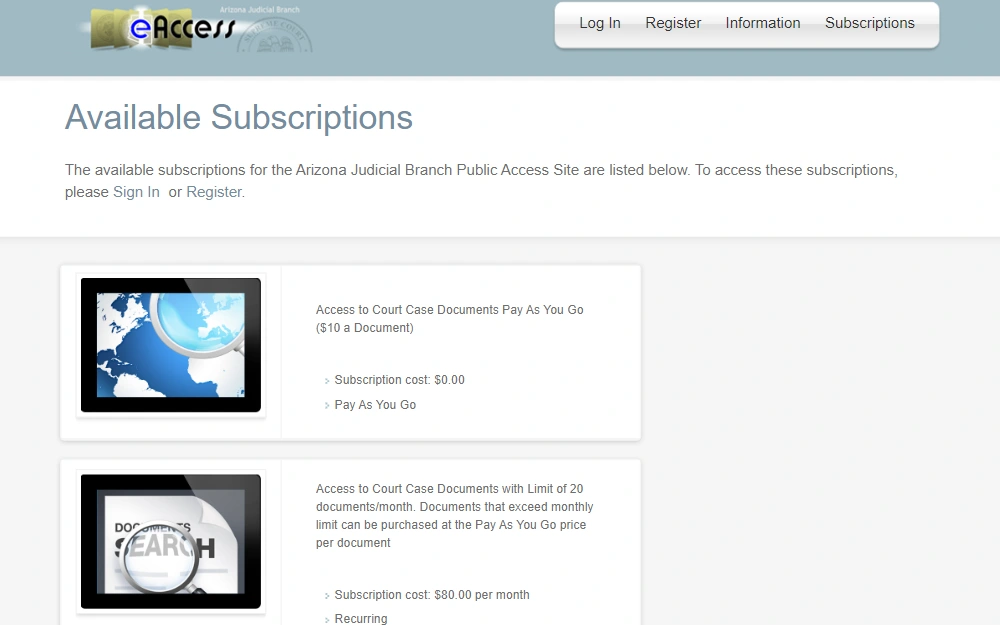
Alternatively, patrons may get in touch with third-party vendors who, for a fee, will search government databases to locate divorce records. This becomes very useful if the requestor does not know where the dissolution record originated from.
Obtaining Divorce Records via Counties & Cities in Arizona
The Clerk of the Superior Court is the point of contact for citizens who need to acquire divorce certificates.6 As mentioned in the previous section, citizens have the option of viewing divorce records using the Online Public Access to Court Information.
However, they may also contact the Clerk of the Superior Court directly to obtain certified copies of divorce records.7 Getting in touch with county rather than state offices is beneficial for the requestor since these tend to have more attentive staff and, as they carry a smaller workload, are likely to process orders and requests quicker.
To showcase the process of retrieving divorce records, the largest and most populated countries will be utilized. These are Maricopa, Pima and Pinal Counties.
Search for Divorce Records in Maricopa County: To access divorce records in Maricopa County, interested parties can request copies of dissolution records from the Maricopa County Clerk of the Superior Court through two methods. These include online and in person requests. Charges for copying and certification are in this fee schedule.
There are several online methods. Individuals who are party to a case may access their case through ECR Online for free via registration; these include family court cases under which divorces fall. Patrons can make an online divorce record request to obtain a certified copy of a dissolution record.
Users may also utilize the case information & docket to look up cases by name or case number; however, they cannot view documents or obtain copies using this method. This service is free. Patrons may also make use of eAccess, as was seen in the previous section.
Interested parties can visit these Maricopa County Superior Court Locations—the actual locations that offer this service include the Customer Service Center, Northwest Regional Court Center, Southeast Court Complex and the Northeast Regional Court Center.8
They may view these records electronically through public access computers, make copies or obtain certified copies.
Acquire Dissolution Certificates in Pima County: Citizens who need to request divorce records in Pima County do not do so from the County Recorder but from the Pima County Clerk of the Superior Court.9 Requestors can order divorce records through a myriad of ways, including mail and email requests as well as in-person visits. Copy fees are set at $0.50 per page, and certified copies with a raised and embossed seal cost $30.00.
Postage and handling and cost for faxing are each $7.00.
Divorce records may also viewed online using the name of the party of the record or case number. This search feature is convenient and free to use.
Interested persons can document their request stating the record they need, names and approximate date of the filing of the dissolution. They may email their request to [email protected]; as the documents are transmitted electronically, there is no postage fee.
Patrons may also fax or phone their request to 520.724.2134 and 520.724.3240 and pay via credit card.
Lastly, citizens can mail in their requests or visit the Pima County Clerk of the Superior Court Monday through Friday, 8 AM to 4:30 PM, at the address below. Make payments of mail requests using money orders payable to the “Clerk of the Court” and include a self-addressed envelope.
Pima County Clerk of the Superior Court
Suite. 241
110 West Congress
Tucson, Arizona 85701
The Clerk of the Superior Court processes orders in 3-5 business days, excluding delivery times—certified copies are not emailed or faxed. Call 520.724.3200 for any questions.
Retrieve Divorce Records from Pinal County: Individuals in Pinal County will need to search for and obtain divorce records from the Clerk of the Superior Court.10 They can view and request copies of dissolution certificates online.
Anyone can find and view dissolution records online at no cost by utilizing the Pinal County Divorce Records Online Search Tool. They can do this by searching using the party name, document type or docket.
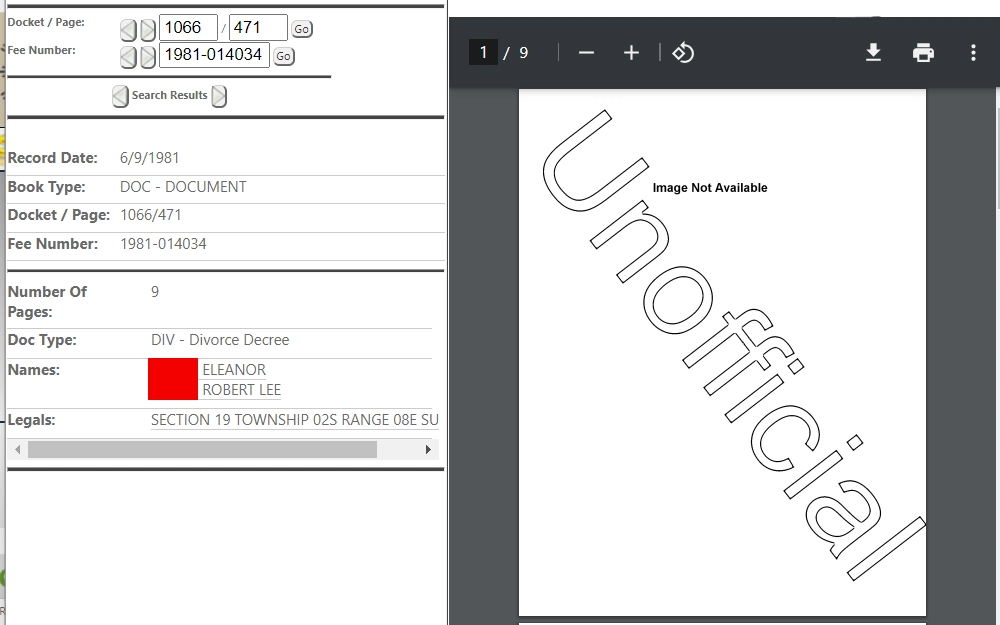
Additionally, interested parties can submit a request for certified copies of dissolution records online. The Clerk of the Superior Court charges $30.00 for every search, $0.50 per page, $30.00 for certification and $7.00 for shipping and handling. To avoid paying a search fee, applicants can use the online resource above to find case information and use it to make the request.
A member of staff will reach out within five business days to confirm the amount due. Applicants can make payments online or by mail. Mail payments are through check or money order payable to the “Clerk of Superior Court.”
Include a self-addressed envelope and mail it to the address below.
Clerk of Superior Court
Post Office Box 2730
Florence, Arizona. 85132
The Clerk will process the order once the office receives the payment; certificates should be ready in another five business days and are mailed to the requestor. For concerns, call toll-free +1(888)431-1311 or 520.509.3555.
Citizens who are searching for divorce records in cities will still need to contact the Superior Court that has jurisdiction over the urban area. The three most populated cities in Arizona are Phoenix, Tucson and Mesa. When searching for divorce records in Arizona using the syntax “[city] City divorce records search,” the respective Superior Court will show up on the results page.
Patrons living in Phoenix may contact the Maricopa County Clerk of the Superior Court, as was seen earlier.12 Tucson residents will need to get in touch with the Pima County Clerk of the Superior Court, and interested parties located in Mesa will also need to contact the Maricopa County Clerk of the Superior Court as advised by the city.
Finding Family Divorce Records via the Arizona State Archives (Free Access)
When citizens are searching for Arizona divorce records that are old for the purpose of tracing their family lineage, they have a myriad of options at their disposal—these include the State Library, Archives & Public Records and the Clerk of the Superior Court.
Divorces in the U.S. were rare before the twentieth century and sometimes illegal; however, these records are important for genealogy research as relatives may find information on ancestors such as property held, where they lived and the children they sired.
The Arizona State Archives contains a divorce index of records that were filed before 1950. This public agency places several online tools at the disposal of requesters, including a Digital Arizona Library (DAZL), which provides access to the state’s Historical Digital Newspapers. The Archives also gives users access to the State of Arizona Research Library Catalog at no cost.
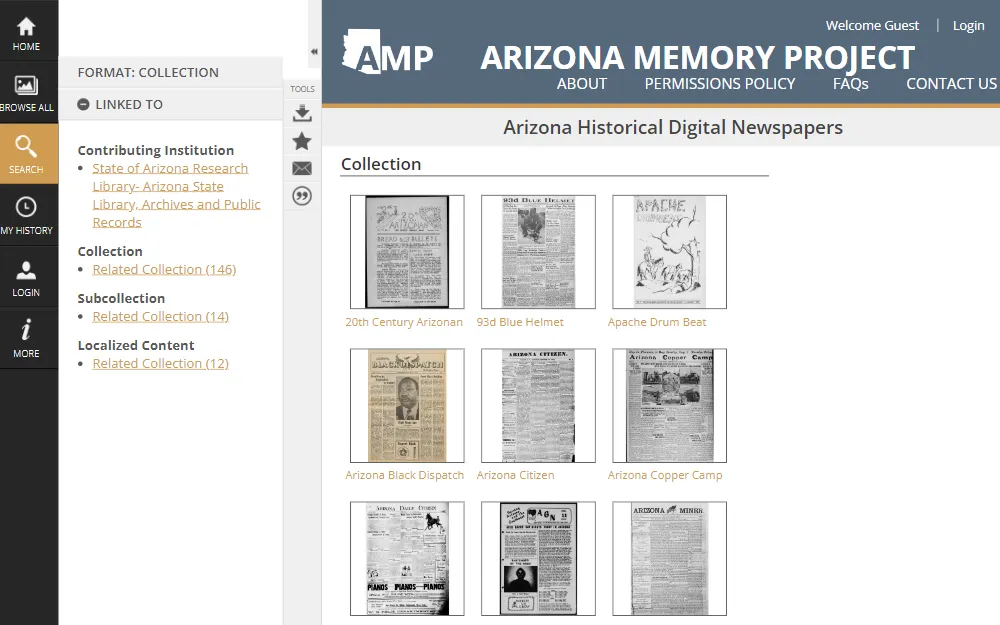
Citizens may also utilize Arizona Genealogy Resources provided by the State Archives—the Archives’ divorce record holdings span between 1864-1972, depending on the county. Interested parties may submit questions on the coverage of the Archives. Patrons can view indices of civil dissolution cases locating files by name and may use the dates on these records to run a newspaper search that could yield more information.
Additionally, patrons may visit the reading room of the Archives but will need to have an appointment—they may schedule an appointment. The Archives and Library phone numbers are 602.926.3720 and 602.926.3870.
Polly Rosenbaum State Archives & History Building
1901 West Madison Street
Phoenix, Arizona 85009
Patrons may also use genealogy resources such as a guide to researching a family tree, Genealogy Information Portals, and the Arizona Biographical Database, which is a free but versatile search tool that scours newspaper articles, books and vertical files.14
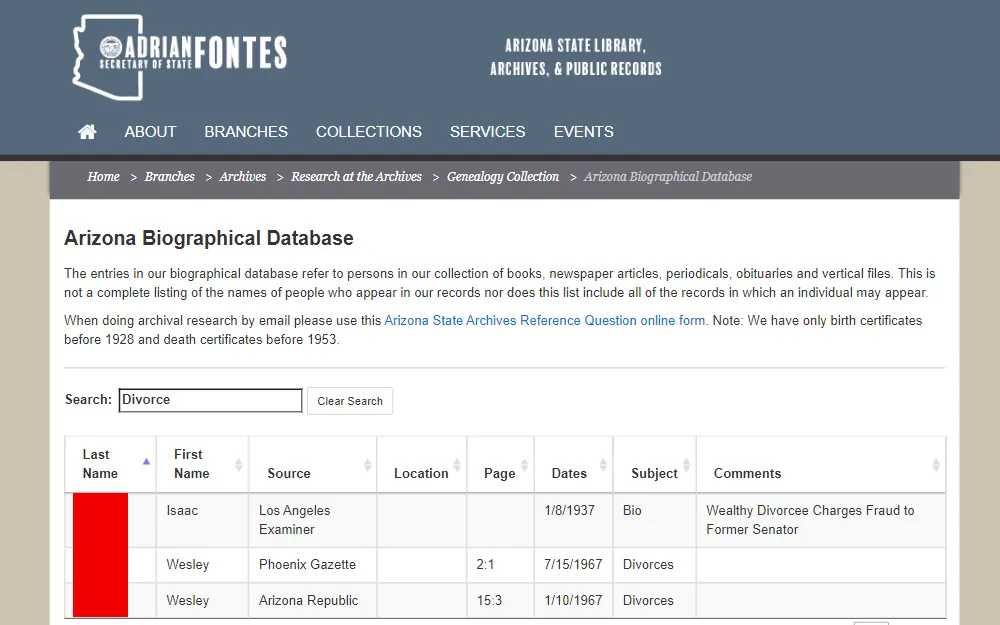
The Clerk of the Superior Court is a viable source for obtaining older divorce records, and the process for executing this was seen earlier.
Interested parties may also contact other libraries in Arizona that may have data that can aid them in their genealogy research.
How To Search for Dissolution of Marriages in AZ
The Superior Courts located in Arizona’s counties are responsible for granting dissolution decrees and are the primary repositories for the records created as a result—they would therefore be the point of contact to obtain these documents.
Dissolution of marriage in Arizona is the legal term for divorce and signals the end of marriage from a legal perspective and involves division of property, settlement of child custody and alimony terms if applicable.
Patrons who need to view public divorce records for adoption, legal matters or any other reasons may do so conveniently online through the Arizona Judicial Branch. This public agency provides an Arizona Dissolution of Marriage Records Search Tool at no cost to citizens. It accesses Municipal, Justice and Superior Courts.
Searchers will select the county where the divorce was filed and search by name or case number.
Additionally, many of the Clerks of the Superior Court have online resources to search for Arizona divorce records for free, as seen earlier. If certified copies of dissolution decrees are required, the Clerks have made available methods to obtain them online, by mail and in person.
It is not possible to locate records of common law divorce in Arizona. This is because Arizona does not consider common law marriages created within its borders as lawful as per A.R.S. § 25-111.
In addition, and unlike other states, Arizona goes on to not acknowledge couples from common law marriages from other jurisdictions that recognize this type of union. In other words, couples married in this way who move from out of state are not considered as being married in Arizona pursuant to A.R.S. § 25-112.
How To Navigate the Arizona Divorce Process: Filing & Addressing Petitions
Before considering filing for a divorce in Arizona, couples need to satisfy some established criteria, including residency requirements and grounds for separation—all dissolution petitions are filed with the Clerk of the Superior Court.
Couples need to have resided in Arizona for at least 90 days before filing for divorce pursuant to Ariz. Rev. Stat. § 25-312. In the cases where there are children in the matrimony, the state must have jurisdiction and legal authority. For this to occur, the parent must have lived with the child for six months in the state as mandated by Ariz. Rev. Stat. §§ 25-1031, barring some exemptions.
Arizona is a no-fault divorce state, and neither party needs to show the fault of the other to initiate the divorce. For most marriages in Arizona, the grounds for divorce are that the marriage is permanently broken, and there is little chance of a reunion. If one spouse denies this, a judge will pause the proceedings for sixty days if requested by either partner for a conciliation.
There are two forms of divorce in Arizona: contested and uncontested divorce. Uncontested dissolutions are the simplest and fastest divorces because both partners have an agreement on the division of assets, alimony (spousal maintenance) and matters regarding children, such as child support. Contested divorces are dissolutions where the couple does not agree on the issues set forth earlier; these tend to be more complicated and lasting.
Legal separation or mensa et thoro is permissible in Arizona, and the process is similar to a dissolution—however, couples that are separated cannot remarry as they would if they were divorced.
Forms and filing fees are found at the respective Clerk of the Superior Court in the county of residence. However, the Arizona Judicial Branch furnishes generic forms that are accepted statewide. These are Dissolution of Marriage Without Children and Dissolution of Marriage With Children forms.
Alternatively, couples may utilize the ezCourtForms which is an interactive portal that helps them know what forms to file; the forms may also be acquired from the Law Library Resource Center.
Couples can view these frequently asked questions to have a better understanding of the process and terminology.
Uncontested Dissolutions: Arizona has a plain procedure for this type of divorce known as a summary consent decree, and before filling it, the couple should have a marital settlement agreement where the division of the assets, parental arrangements and alimony, if applicable, are addressed. The couple must agree the marriage is completely broken.
If children are present in the marriage, the couple will need to attend a Parenting Information Program.
Upon assembling and filling the necessary forms, make three copies and file the divorce papers at the Clerk’s Office in the petitioner’s county of residence. While filing fees vary, they typically range between $200.00 and $300.00. Filing fees for a summary consent decree are half of the fees for a contested divorce that elicits a response.
Couples may request to have their filing fees waived.
If filing in person, the clerk will stamp the date and time and notarize the signature at no cost. There is no need to attend a hearing in this type of divorce or have a spouse serve the other divorce documents. Once the judge reviews and finds the documents to be in order, he or she will sign the decree.
The decree is final 60 days after the filing of the summary.
Here are some frequently asked questions on the consent decree.
Contested Divorce: In contested divorces, the parties do not see eye to eye on the matters detailed earlier. Either form is filed depending on whether or not they are children. After filing the divorce documents with the Clerk of Court, it is the responsibility of the petitioner to serve the annulment papers to the defendant.
If the spouse is cooperating, it is sufficient for the plaintiff to mail or hand the copies and have the defendant (spouse) sign and notarize an Acceptance of Service Form.
Alternatively, they may enlist the services of a deputy sheriff to deliver the papers or send them through a courier service where a signature is required.
There are exceptional cases where a spouse isn’t able to reach the defendant; in cases like this, contact the Clerk of Court pursuant to Ariz. Rules Fam. Law Proc., rules 40, 41. Upon receiving the papers, the defendant has twenty days to respond—thirty if they are living out of state. If the defendant does not respond, the petitioner may receive a default hearing after applying for a default.16
Contested divorces are lengthy due to the need to gather evidence and attendance of other court hearings before the actual divorce trial. It is advisable to acquire legal counsel, particularly for these types of divorces.
Arizona divorce records are available for the public to view and scrutinize; this streamlined resource provides valuable resources and links to navigate public channels to obtain them regardless of what they are required for; look up far more record types (such as criminal history, warrants, property details, court cases, and more) using the Arizona free public information search instructions.
References
1Arizona Revised Statutes. Arizona State Legislature. (2023) Retrieved November 13, 2023, from <https://www.azleg.gov/arsDetail/?title=39>
2Vital Records. Pinal County. (n.d.) Retrieved November 13, 2023, from <https://www.pinal.gov/1073/Vital-Records>
3U.S. Marriage And Divorce Rates For Women By State. United States Census Bureau. (n.d.) Retrieved November 13, 2023, from <https://www.census.gov/library/visualizations/interactive/marriage-divorce-rates-by-state-2011-2021.html>
4Public Access to Court Information. Arizona Judicial Branch. (2023) Retrieved November 13, 2023, from <https://apps.supremecourt.az.gov/publicaccess/(X(1)S(rykvfzqk3mdjc1455goi4j45))/caselookup.aspx?AspxAutoDetectCookieSupport=1>
5Available Subscriptions. eAccess. (n.d.) Retrieved November 13, 2023, from <https://www.azcourtdocs.gov/subscriptions.html>
6Accessing Arizona Public Records. Arizona State Library. (n.d.) Retrieved November 13, 2023, from <https://azlibrary.gov/arm/accessing-arizona-public-records>
7Superior Court Clerks. Arizona Supreme Court. (2023) Retrieved November 13, 2023, from <https://www.azcourts.gov/selfservicecenter/Superior-Court-Clerks-of-the-Court>
8Office Locations and Hours. Maricopa County Superior Court. (n.d.) Retrieved November 13, 2023, from <https://www.clerkofcourt.maricopa.gov/about/office-hours-locations>
9Other Document Agencies and Links. Pima County Recorder’s Office. (2023) Retrieved November 13, 2023, from <https://www.recorder.pima.gov/otheroffices>
10Request Copies of Court Records. Arizona Supreme Court. (n.d.) Retrieved November 13, 2023, from <https://www.coscpinalcountyaz.gov/166/Request-Copies-of-Court-Records>
11Divorce Decree. Pinal County. (n.d.) Retrieved November 13, 2023, from <https://acclaim.pinalcountyaz.gov/AcclaimWeb/Details/>
12Obtaining Records. Maricopa County Superior Court. (n.d.) Retrieved November 13, 2023, from <https://www.clerkofcourt.maricopa.gov/records/obtaining-records>
13Arizona Historical Digital Newspapers. State of Arizona Research Library. (n.d.) Retrieved November 13, 2023, from <https://azmemory.azlibrary.gov/nodes/view/3>
14Genealogy Collection. Arizona State Library. (n.d.) Retrieved November 13, 2023, from <https://azlibrary.gov/arm/research-archives/genealogy-online-resources>
15Arizona Biographical Database. State of Arizona Research Library. (n.d.) Retrieved November 13, 2023, from <https://apps.azlibrary.gov/bio/>
16Default. The Judicial Branch of Arizona. (n.d.) Retrieved November 13, 2023, from <https://superiorcourt.maricopa.gov/family/default/>
